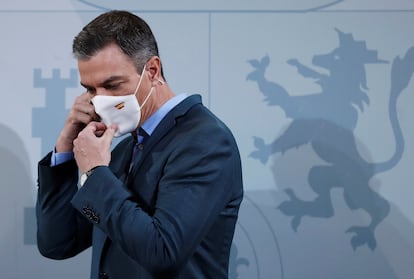Spain’s PM to meet with regional leaders to discuss new Covid-19 measures over ‘real risk’
With transmission on the rise, Pedro Sánchez says additional initiatives may be required but insists high vaccination rate is preventing extreme strain on hospitals

Spanish Prime Minister Pedro Sánchez has called a special meeting for Wednesday with the heads of the country’s regional governments, which are in charge of their own Covid-19 containment campaigns, to discuss the spread of the new omicron variant and “evaluate new measures that could be introduced in the coming weeks.”
Sánchez on Sunday described the rise in coronavirus transmission ahead of the Christmas holidays as “a real and certain health risk.”
Spain on Friday entered the highest-risk scenario in the government’s traffic light system, with a 14-day incidence rate of 511 cases per 100,000 people, lower than in several other European countries but still “requiring an intensification” of measures to curb virus expansion, said the Spanish leader.
The prime minister, who is the leader of Spain’s Socialist Party (PSOE), made these statements during an address in Barcelona where he was attending a congress of the party’s Catalan branch. Catalonia on Friday took a new step to curb coronavirus transmission by announcing that all close contacts of a positive case must self-isolate for 10 days, regardless of whether they are vaccinated.
So far, neither the central nor the regional governments seem keen on a return to the strict restrictions and travel bans of last year’s Christmas season. Most regions were hoping that vaccines, the Covid pass and basic recommendations on hand-washing, indoor masking and ventilation would be enough to overcome the crisis without too much damage to social life or the economy.
But Javier Lambán, the premier of Aragón, on Monday applauded the decision to hold a general meeting of leaders. “It would be desirable to move towards common positions. We could improve by unifying our measures,” he said in an interview on the state broadcaster RTVE. And the Basque premier, Iñigo Urkullu, spoke along similar lines, noting that “the disparity of responses and decisions is not positive.”
The first conclusion is that vaccination works and that this health crisis can only be stopped with scienceSpanish PM Pedro Sánchez
Despite the recent rise in cases across the country, Sánchez insisted that Spain’s high vaccination rate puts the country in a much better situation than during previous waves of the coronavirus.
“It is true that this new wave of expansion of the virus has very different characteristics and affects us in very different circumstances,” he said. “With notably higher contagion figures, we have lower hospitalization and intensive care occupation than a year ago. The first conclusion is that vaccination works and that this health crisis can only be stopped with science. A year ago not one single vaccine had been administered in our country, and now [coverage] is 90%.”
According to the most recent data released by the Health Ministry on Friday, 38.6 million citizens have been fully immunized (91.7%); 70% of the over-60s have received a booster shot and vaccination of the under-12s is underway. This mass immunization is widely viewed as a barrier that will avoid the complete overload of the healthcare system.
But even though the impact on hospitals has so far been lower during this sixth wave, hospitalizations due to Covid-19 have nearly tripled in the last month, and there are 1,306 patients in intensive care.
Antigen tests running out in Spain
With transmission on the rise and people coming together for Christmas gatherings, antigen tests are selling out fast in Spanish pharmacies. A growing number of establishments are warning customers that there are no more self-testing kits available. And new shipments may take as long as 15 days to arrive. Pharmacists and epidemiologists are asking people to make “a responsible use” of these tests and to “avoid hoarding.”
“Suppliers are telling us that there are tests. If they’re not available at one pharmacy, they’ll be available at another,” said Ana López-Casero, an official with the General Council of Pharmacists of Spain. But demand has multiplied by five and even by seven in certain parts of Spain compared with previous months. The two main distributors in the Canary Islands, Cofarca and Cofares, ran out of stock on Friday, according to industry sources. And in Madrid, residents of the city center may find themselves having to travel to outlying towns and villages in search of a kit.
Tu suscripción se está usando en otro dispositivo
¿Quieres añadir otro usuario a tu suscripción?
Si continúas leyendo en este dispositivo, no se podrá leer en el otro.
FlechaTu suscripción se está usando en otro dispositivo y solo puedes acceder a EL PAÍS desde un dispositivo a la vez.
Si quieres compartir tu cuenta, cambia tu suscripción a la modalidad Premium, así podrás añadir otro usuario. Cada uno accederá con su propia cuenta de email, lo que os permitirá personalizar vuestra experiencia en EL PAÍS.
¿Tienes una suscripción de empresa? Accede aquí para contratar más cuentas.
En el caso de no saber quién está usando tu cuenta, te recomendamos cambiar tu contraseña aquí.
Si decides continuar compartiendo tu cuenta, este mensaje se mostrará en tu dispositivo y en el de la otra persona que está usando tu cuenta de forma indefinida, afectando a tu experiencia de lectura. Puedes consultar aquí los términos y condiciones de la suscripción digital.









































